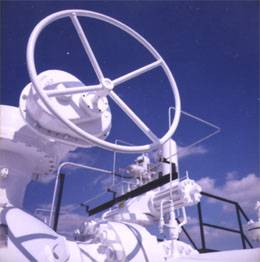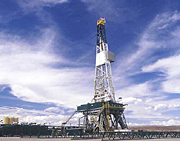Natural Gas
One of the interesting ideas for
an alternative fuel is natural gas. Natural Gas is extracted from
underground resevoirs. It is composed of a mixture of hydrocarbons,
mainly methane. Natural Gas can be stored on a vehicle in two forms, as
compressed natural gas (CNG) at 3,000 or 3,600 psi, or as liquified
natural gas (LNG) at 20 - 150 psi. Manufactorers are saying that you
will either be able to fill up at a station much like you would
gasoline, or you woule be able to have a compressor in your home to
fill up that would cost only about $1,000 dollars. The at home
compressors would be available for "slow-fill" fueling, where you could
fill up in a couple minutes at a station.
There are many benefits to using natural gas. Foremost, it is extremely clean burning. It is one of the cleanest burning alternative fuels. The air exhaust emissions are much lower than those of normal gas powered vehicles. With the use of natural gas, smog gases are significantly reduced: carbon monoxide is reduced by 90%, nitrogen oxodes are reduced 60%, and carbon dioxide is reduced 30 - 40%. In heavy duty vehicles, it has been found that natural gas reduces CO and particulate matter by over 90%, and NO by 50%.
The disadvantages of using Natural Gas are much the same as many of the other alternative fuels. The range on a gallon of gas is significantly less than that of a normal gas powered vehicle. Also Natural Gas would require storage cylinders on vehicles, which would take up some of the payload space in vehicles. Since the Natural Gas would be stored at high pressure, the tanks would need frequent inspection and certification. Finally, although the per gallon cost of Natural Gas is actually less expensive, it is fairly expensive to convert a vehicle to be powered by Natural Gas.


Natural Gas Valves Natural Gas Refinery
There are many benefits to using natural gas. Foremost, it is extremely clean burning. It is one of the cleanest burning alternative fuels. The air exhaust emissions are much lower than those of normal gas powered vehicles. With the use of natural gas, smog gases are significantly reduced: carbon monoxide is reduced by 90%, nitrogen oxodes are reduced 60%, and carbon dioxide is reduced 30 - 40%. In heavy duty vehicles, it has been found that natural gas reduces CO and particulate matter by over 90%, and NO by 50%.
The disadvantages of using Natural Gas are much the same as many of the other alternative fuels. The range on a gallon of gas is significantly less than that of a normal gas powered vehicle. Also Natural Gas would require storage cylinders on vehicles, which would take up some of the payload space in vehicles. Since the Natural Gas would be stored at high pressure, the tanks would need frequent inspection and certification. Finally, although the per gallon cost of Natural Gas is actually less expensive, it is fairly expensive to convert a vehicle to be powered by Natural Gas.


Natural Gas Valves Natural Gas Refinery